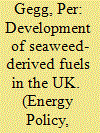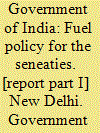|
|
|
Sort Order |
|
|
|
Items / Page
|
|
|
|
|
|
|
| Srl | Item |
| 1 |
ID:
168665


|
|
|
|
|
| Summary/Abstract |
Macroalgae (seaweed)-derived fuels are gaining increasing attention due to the high rate of seaweed growth, its lack of lignocellulose (which makes for energy-efficient processing), its lack of need for land or freshwater, and its potential suitability for commercial applications in the UK. However, while technological issues are progressively being solved, wider issues of stakeholder and public perception have largely been ignored, potentially hindering the development of this technology. This research fills this gap by conducting 19 interviews with stakeholders and 7 focus groups with members of the public to gain a deeper and broader understanding of perceptions of macroalgae-derived fuels. The results highlight the technological promise and confidence in the potential of macroalgae-derived fuels. However, they also emphasise conflicts and uncertainties among stakeholders (e.g. competition with other high-value products derived from macroalgae) and the general public (e.g. conflict with marine users). This paper provides insight into potential social resistance and key issues in the macroalgae-to-fuels supply chain. This information will enable two-way communication between everyone involved and increase the likelihood of successfully developing this supply chain. Key policy issues are discussed to facilitate this communication and encourage investment in the process.
|
|
|
|
|
|
|
|
|
|
|
|
|
|
|
|
| 2 |
ID:
031966


|
|
|
|
|
| Publication |
New Delhi, Government of India, 1972.
|
| Description |
v.p
|
|
|
|
|
|
|
|
|
|
|
|
Copies: C:1/I:0,R:0,Q:0
Circulation
| Accession# | Call# | Current Location | Status | Policy | Location |
| 015863 | 333.82150954/IND 015863 | Main | On Shelf | General | |
|
|
|
|
| 3 |
ID:
132650


|
|
|
|
|
| Publication |
2014.
|
| Summary/Abstract |
The world×s most expensive motor fuel (gasoline, diesel and LPG) is sold most likely in the Republic of Turkey. This paper investigates the key issues related to the motor fuel prices in Turkey. First of all, the paper analyses the main reason behind high prices, namely motor fuel taxes in Turkey. Then, it estimates the elasticity of motor fuel demand in Turkey using an econometric analysis. The findings indicate that motor fuel demand in Turkey is quite inelastic and, therefore, not responsive to price increases caused by an increase in either pre-tax prices or taxes. Therefore, fuel market in Turkey is open to opportunistic behavior by firms (through excessive profits) and the government (through excessive taxes). Besides, the paper focuses on the impact of high motor fuel prices on road transport associated activities, including the pattern of passenger transportation, motorization rate, fuel use, total kilometers traveled and CO2 emissions from road transportation. The impact of motor fuel prices on income distribution in Turkey and Turkish public opinion about high motor fuel prices are also among the subjects investigated in the course of the study.
|
|
|
|
|
|
|
|
|
|
|
|
|
|
|
|
| 4 |
ID:
150045


|
|
|
|
|
| Summary/Abstract |
A low carbon fuel standard (LCFS) is a market-based policy that specifies declining standards for the average lifecycle fuel carbon intensity (AFCI) of transportation fuels sold in a region. This paper: (i) compares transportation fuel carbon policies in terms of their economic efficiency, fuel price impacts, greenhouse gas emission reductions, and incentives for innovation; (ii) discusses key regulatory design features of LCFS policies; and (iii) provides an update on the implementation status of LCFS policies in California, the European Union, British Columbia, and Oregon. The economics literature finds that an intensity standard implicitly taxes emissions and subsidizes output. The output subsidy results in an intensity standard being inferior to a carbon tax in a first-best world, although the inefficiency can be corrected with a properly designed consumption tax (or mitigated by a properly designed carbon tax or cap-and-trade program). In California, from 2011 to 2015 the share of alternative fuels in the regulated transportation fuels pool increased by 30%, and the reported AFCI of all alternative fuels declined 21%. LCFS credit prices have varied considerably, rising to above $100/credit in the first half of 2016. LCFS programs in other jurisdictions share many features with California's, but have distinct provisions as well.
|
|
|
|
|
|
|
|
|
|
|
|
|
|
|
|
|
|
|
|
|